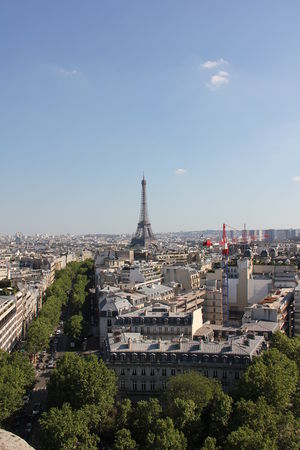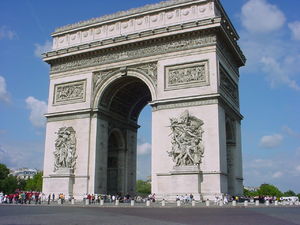Paris, France: Difference between revisions
imported>JeromeDelacroix (Update on the mayor) |
imported>JeromeDelacroix (Anne Hidalgo's second term) |
||
| Line 7: | Line 7: | ||
Paris forms its own ''[[commune]]'', one of tens of thousands of administrative divisions that the country is divided into. Within the ''commune'', the city divides itself into 20 ''arrondissements municipaux'', or 'municipal boroughs'. Each of these has its own distinct character, unlike for instance the centre of [[London]], which is mostly home to shops and government buildings. Diverse communities inhabit the heart of Paris: there is a [[Chinatown]] in the 13th arrondissement and a popular [[gay village]] in the 4th. This area is also where visitors will find the [[Ile St Louis]], one of two islands in the River [[Seine]] that divides the city; the island is often regarded as a separate 'village', with some in its own little community viewing Paris as another place altogether.<ref>''[[Daily Telegraph]]'': '[http://www.telegraph.co.uk/travel/main.jhtml?xml=/travel/2005/04/25/etparisisle.xml Capital island]'. 25th April 2005.</ref> | Paris forms its own ''[[commune]]'', one of tens of thousands of administrative divisions that the country is divided into. Within the ''commune'', the city divides itself into 20 ''arrondissements municipaux'', or 'municipal boroughs'. Each of these has its own distinct character, unlike for instance the centre of [[London]], which is mostly home to shops and government buildings. Diverse communities inhabit the heart of Paris: there is a [[Chinatown]] in the 13th arrondissement and a popular [[gay village]] in the 4th. This area is also where visitors will find the [[Ile St Louis]], one of two islands in the River [[Seine]] that divides the city; the island is often regarded as a separate 'village', with some in its own little community viewing Paris as another place altogether.<ref>''[[Daily Telegraph]]'': '[http://www.telegraph.co.uk/travel/main.jhtml?xml=/travel/2005/04/25/etparisisle.xml Capital island]'. 25th April 2005.</ref> | ||
Paris is the centre of national government. The ''[[Elysée Palace|Palais de l'Élysée]]'' (Elysée Palace) is the official residence of the [[President of France]]. The [[Mayor of Paris]] is a highly influential position, with the office holder usually hosting visiting [[Head of state|heads of state]] at the [[Hotel de Ville (Paris)|Hotel de Ville]] (City Hall).<ref>''Paris.fr'': '[http://www.paris.fr/english/paris-a-city-with-an-international-profile/heads-of-state-and-prominent-figures-received-at-the-city-hall/p8138 Heads of state and celebrities received at the City Hall]'.</ref> [[Bertrand Delanoë]] served as Mayor from March 2001 to April 2014. He was the first [[Socialist Party (France)|Socialist]] incumbent since 1971. In April 2014, another socialist was elected, the first woman to serve as Paris Mayor: [[Anne Hidalgo]] | Paris is the centre of national government. The ''[[Elysée Palace|Palais de l'Élysée]]'' (Elysée Palace) is the official residence of the [[President of France]]. The [[Mayor of Paris]] is a highly influential position, with the office holder usually hosting visiting [[Head of state|heads of state]] at the [[Hotel de Ville (Paris)|Hotel de Ville]] (City Hall).<ref>''Paris.fr'': '[http://www.paris.fr/english/paris-a-city-with-an-international-profile/heads-of-state-and-prominent-figures-received-at-the-city-hall/p8138 Heads of state and celebrities received at the City Hall]'.</ref> [[Bertrand Delanoë]] served as Mayor from March 2001 to April 2014. He was the first [[Socialist Party (France)|Socialist]] incumbent since 1971. In April 2014, another socialist was elected, the first woman to serve as Paris Mayor: [[Anne Hidalgo]]. She was elected for a second term in June 2020. | ||
==Footnotes== | ==Footnotes== | ||
{{reflist|2}} | {{reflist|2}} | ||
Revision as of 15:18, 3 September 2020

A view of Paris from the Arc de Triomphe, with the Eiffel Tower in the background.
Paris is the capital city of France, and the cultural centre of the French-speaking world. It is instantly recognisable by its landmarks such as the Eiffel Tower and the Arc de Triomphe, and is also home to the world-class Louvre museum.
Paris forms its own commune, one of tens of thousands of administrative divisions that the country is divided into. Within the commune, the city divides itself into 20 arrondissements municipaux, or 'municipal boroughs'. Each of these has its own distinct character, unlike for instance the centre of London, which is mostly home to shops and government buildings. Diverse communities inhabit the heart of Paris: there is a Chinatown in the 13th arrondissement and a popular gay village in the 4th. This area is also where visitors will find the Ile St Louis, one of two islands in the River Seine that divides the city; the island is often regarded as a separate 'village', with some in its own little community viewing Paris as another place altogether.[1]
Paris is the centre of national government. The Palais de l'Élysée (Elysée Palace) is the official residence of the President of France. The Mayor of Paris is a highly influential position, with the office holder usually hosting visiting heads of state at the Hotel de Ville (City Hall).[2] Bertrand Delanoë served as Mayor from March 2001 to April 2014. He was the first Socialist incumbent since 1971. In April 2014, another socialist was elected, the first woman to serve as Paris Mayor: Anne Hidalgo. She was elected for a second term in June 2020.
Footnotes
- ↑ Daily Telegraph: 'Capital island'. 25th April 2005.
- ↑ Paris.fr: 'Heads of state and celebrities received at the City Hall'.
